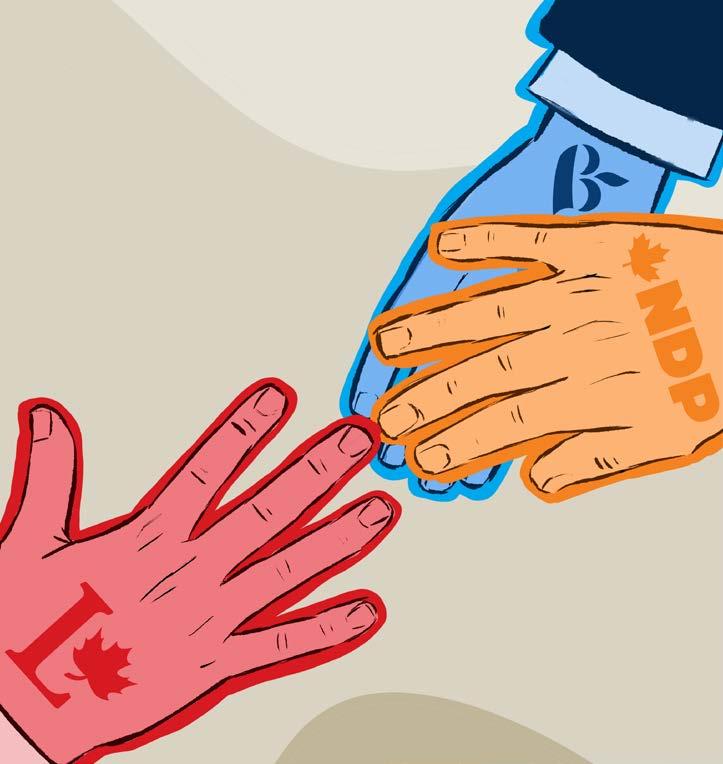
13 minute read
Editorial
from 1 December 2021
Power-tripping administration must be set straight for students’ sake
EDITORIAL
From a student’s perspective, it can sometimes be hard to see the conflict between the University of Manitoba Faculty Association (UMFA) and the University of Manitoba as anything but a massive inconvenience. Some classes continue undeterred with others unceremoniously called to a halt with no rhyme or reason from student to student. Graduation dates are in jeopardy — a nightmare for international students and those with postgraduation jobs lined up — and there is a real danger the winter term reading week will be lost if the strike goes on much longer.
In addition, the sheer uncertainty of the situation is exhausting. Students don’t know when our regular course loads will return, and we don’t know how much notice we will have when they do. Many students have been debating picking up extra shifts at work — to pay tuition, no less — but can’t commit because they don’t know how long they’ll be available. The per-hour working world does not look kindly upon uncertain schedules liable to change with very little notice, especially this close to the holidays.
And what of the courses themselves? For many subjects, it’s difficult to jump back in after no class time for several weeks. Students are faced with the choice of trying to claw back familiarity lost over the strike or voluntarily withdrawing from the class through no fault of their own, both of which could have serious consequences for their degree plans.
It is exactly this frustration, this feeling of helpless impotence, that should push every single student at the university to support UMFA and the strike.
I was a student during the 2016 strike, which lasted for three weeks and resulted in a one-year agreement with no salary increase. It was UMFA’s first strike since 2001, which only lasted four days. A number of incidents have further eroded the relationship between UMFA, the university administration and the provincial government since then, and the effect is palpable. In 2016, as I remember it, the mood was determined but apologetic —
the academic strike was a new and frightening concept to most students, and both UMFA and the university made significant efforts to explain what was happening and maintained an outwardly friendly relationship. It was as if two parents who had a fight were reassuring the little ones everyone still loved each other — disagreements sometimes happen, and everything would be okay.
But this disagreement has gone on for years now, and what seemed like a small fight has escalated to full-blown resentment. UMFA and its members are no longer interested in reassurances. Today, the overwhelming impression is one of bitter indignation, acrimonious exasperation. UMFA has had enough. have happened so close together that older students like me can remember them vividly. In both cases, the issues raised by UMFA have been fundamentally linked to common student complaints like office hours or quality of instruction.
Regardless of one’s opinion on the amount of money faculty members
make, the simple fact of the matter is that U of M wages are embarrassingly low compared to other universities. Students are losing opportunities to connect with and learn from the brightest minds in every discipline because the pay isn’t worth it for academics to come here. Why would they? Any student working a parttime job would never choose the minimum-wage job over the one offering a few dollars more an hour, and academics are no different. Even the ones already employed at the U of M are leaving in search of better opportunities.
And still, tuition fees have risen for the past three years and international students are consistently treated like cash cows. Where is all that money going? It’s certainly not going to the educators — the people students actually interact with on a day-to-day basis. The disparity was even more glaring during the worst of the COVID-19 pandemic, when the campus was empty yet students continued to pay fees for on-campus resources we couldn’t use.
Tuition pays for the salaries of both the faculty and the administration, but only one of these two are sending out press releases with misleading or outright incorrect information. One group shut down UM Learn, the other pushed for reinstatement so students could continue to study during the strike. It’s hard not to draw conclusions about the two sides’ relative opinion of their audience’s intelligence and who exactly wants students to keep learning.
The strike is an awful situation for students, but it is one that needs to happen in order to make the U of M worth attending. A university consistently shying away from paying its employees an appropriate wage and a province prone to interfering in academic matters to maximize profit over education is not a constructive formula. If the U of M continues to treat its faculty with such little respect, students will have little hope to build a more equitable institution.
This dispute is a chance to push back against frustrations students have been raising for a long time. It is important that students capitalize on this moment and demand the quality of education we deserve by forcing the administration and provincial government to answer for their actions. The strike may seem like it has little benefit to the condition of students’ lives, but we have a unique opportunity to leave the U of M better than we found it.
graphic / Marina Djurdjevic /
staff
words / Sarah Doran /
staff
More questions than answers in speech from the throne
Trudeau’s partisan games preventing a clear pathway for Parliament to work
COMMENT
Ivan Nuñez Gamez, volunteer staff The Liberal Party of Canada pitched itself as the progressive option on the campaign trail, but the speech from the throne on Nov. 23 lacked bold new ideas. Instead of emphasizing challenges of Canadians — such as the absence of universal pharmacare or ending fossil fuel subsidies — the new Liberal government presented a plan that lacks vision and heavily relies on past promises that have yet to be fulfilled. Though the speech carried a cooperative tone, the New Democratic Party (NDP) was not buying it and questioned Prime Minister Justin Trudeau’s stance as a progressive.
Over two months after a heavily criticized snap election, Parliament has reconvened and a Liberal agenda that outlines the party’s priorities has been put forward. The long-awaited speech from the throne was received critically by most party leaders. The speech was incredibly short, lacked clear details on an action plan to achieve legislative goals and was vastly similar to past throne speeches. The Liberals overused collaborative language and exploited supposed common ground they possess with opposition parties as leverage to gain appeal among members of Parliament — a move that left a sour taste in the mouths of the opposition.
The Conservative party emphasized the potential economic repercussions the Liberal spending agenda could cause and maintained that Canada is facing an inflation crisis. Inflation is currently at an 18-year high and despite being in line with what economists predicted, Canadians are starting to face the consequences. Costs of gasoline, groceries, energy and housing are skyrocketing, causing the wealth gap to grow every day.
Despite the adversities Canadians are facing, Trudeau’s speech from the throne brands the inflationary problem as a problem relating to COVID-19, suggesting that it does not require any response. In fact, inflation is only mentioned once throughout the speech. But the economy was not the only shortcoming in the speech.
New social welfare policies were evidently lacking. Liberals are marketing their few successes without much vision about what it needs to continue to do for Canadians. The party openly gloated about providing affordable child care to nine provinces and territories but ignored any discussion about universal pharmacare, which has been in past throne speeches. Studies have proven providing universal pharmacare is a win-win situation that not only improves the quality and accessibility of health care but could also save the Canadian economy billions of dollars. Despite the benefits, the Liberal party has, of late, turned down the idea.
The Liberal party’s action to counter climate change — an issue the party indicated was one of its top priorities — was eagerly questioned by the NDP due to the Liberals’ lack of effort to end fossil fuel subsidies. These subsidies cost taxpayers $3.3 billion annually and are paid directly to coal, oil and gas companies to pollute. Despite committing to stopping financing fossil fuel projects outside the country by the end of 2022, Trudeau is not leading by example. Ending fossil fuel subsidies would not only benefit the fight against climate change — it would make much more funding available for social welfare programs.
Besides just embracing co-operation and finding common ground among party leaders, the speech from the throne displayed a very general message that left Canadians wondering if Parliament will be able to function adequately in the coming months. Liberals sold themselves as the only viable option that would both prevent the Conservative party from forming a government and bring forward progressive policies. Where are those promises? By playing it safe with a speech from the throne, the Liberals are displaying strong partisanship despite its minority situation. Being a progressive is far more than a fancy word used to attract voters — it is a moral stance for better justice, equity and safety. Trudeau must stop talking and start acting.

Fishers are not the cause of Lake Winnipeg’s condition
Fisheries a convenient and inexpensive scapegoat for PC ambitions
COMMENT
Lucas Edmond, staff
Although it was surprising that efforts to improve Lake Winnipeg’s deteriorating condition were included in Manitoba’s most recent speech from the throne, it is unsurprising that the speech glazed over real and concrete solutions about how the Progressive Conservative party (PC) plans to do so.
In the speech, the PCs made only brief reference to Lake Winnipeg, making it seem like it was only worth mentioning as a means to avoid the party’s age-old conflict with environmentalists. “We cannot allow Lake Winnipeg to be polluted any longer, and we must protect species like our moose population from threats,” the madame speaker said on behalf of the PCs. The speech then outlined that the PCs would invest in the Fish and Wildlife Enhancement Fund Act to supposedly improve the lake’s condition. By doing so, the government pawned off Lake Winnipeg’s pollution to Indigenous fishers and fisheries who rely on the lake for their livelihoods.
Although additional investments into the management and regulatory structures that oversee sustainability practices on Lake Winnipeg would be useful, it is by no means a project that comes close to burying the ecological crisis the lake is currently experiencing. In many ways, by emphasizing fishing, the PCs are redirecting the public’s gaze from more expensive, but necessary, solutions. Perhaps it is yet another bid to make Manitobans believe Premier Heather Stefanson is different from Brian Pallister’s administration. Politics is truly a game of checkers for Manitoba’s PCs.
Fisheries have been under-managed for decades, meaning investments toward making the industry more sustainable via consultation with local stakeholders are crucial. However, if we are playing a zero-sum game — as it seems the PCs are keen to do — radical investment in curbing nutrient pollution must be prioritized. The life of Lake Winnipeg depends on it.
Overfishing is still a threat to the lake, especially considering species like the sauger have virtually collapsed in the past decade and the walleye population is rapidly dwindling. However, are fisheries primarily to blame for the diminishing spawning rates among these species? Absolutely not. Fisheries and Indigenous fishers are more of a convenient target if anything.
Many officials, with little connection to Lake Winnipeg or the communities that line its coast, suggest fishers are the problem. Discourse in these circles often labels fishers as if they have no regard for the environment they depend on. Many of the reports these officials rely on are from ecologists who look at natural phenomena in isolated sample sizes, but these researchers often have little experience analyzing the social dynamics of the lake — the intimate knowledge that locals have about the lake’s ecology, and their care for its condition, may surprise officials if they were attentive enough to ask.
Instead of blaming fishers for the lake’s pollution, the government ought to direct its criticism inward. Fishers from the north basin of the lake have complained about Manitoba Hydro’s destructive presence for decades. Northern Indigenous communities that rely on commercial fishing have noted that the erosion and nutrient pollution caused by hydroelectric dams have struck the industry hard.
Just decades after the Jenpeg Generating Station started regulating Lake Winnipeg’s water levels in 1970, algae levels were reported to have quadrupled. Researchers have contended that runoff and erosion caused from the sporadic flooding from the hydroelectric dams have resulted in damaging levels of phosphorus and nitrogen, which algae relies on to grow. Once the algae die, its decomposition sucks up oxygen from the surrounding lake and may kill fish in the process.
Manitoba has made efforts to reduce nutrient pollution, but in ill-advised and damaging ways. For example, in 1990 researchers cut off all sources of nitrogen while leaving phosphorus untouched. This nitrogen-reduction project cost the government more than a billion dollars and 25 years after its conception the project was found to have had a damaging effect on the lake. Why? Because some algae can produce its own nitrogen — primarily dangerous and neurotoxic cyanobacteria. As a result, the project likely killed off less dangerous algae and overwhelmed the lake with rapidly growing rates of this deadly algae which has been known to damage fish populations.
Beyond nutrient pollution, Manitoba Hydro also decimates fish populations by regulating lake levels. Large swaths of fish eggs die when exposed to air, and this has a impact on spawning seasons.
It seems the PCs are continuing their horrific environmental legacy by making investments that likely won’t curb enough harmful pollution to save the lake. Instead, the party is producing the very conditions that it is exploiting for political capital. In fact, in the throne speech, the PCs contradictorily glorified Manitoba Hydro as “the crown jewel of our Crown corporations” just before asserting Lake Winnipeg must be protected.
To be fair, Manitoba Hydro is far from the primary driver of nutrient pollution — that title belongs to the Red River and Winnipeg’s waste-water management. However, its impacts are far from null and blaming fishers before Manitoba Hydro is a political oversight almost worth laughing at.
Historically, Manitoba has treated Lake Winnipeg as a sink for resources, citing the lake’s economic value as motivation to maintain its ecological integrity. But this approach means sustaining the bare minimum of environmental standards to ensure its supposed value does not diminish. The result of this approach is a policy of perpetual catch-up — pollute as you go and fix the problem later. That is exactly what the PCs are doing when they blame the sustainability practices of fishers for the lake’s pollution and utter humble praises for Manitoba Hydro in the same speech.
Investment in fish management is a minor technocratic solution to Lake Winnipeg’s declining fish populations, but it does little to combat the dangerous conditions we are exposing the lake to. If the government doesn’t focus on nutrient pollution soon, there won’t be any fish left to manage.






